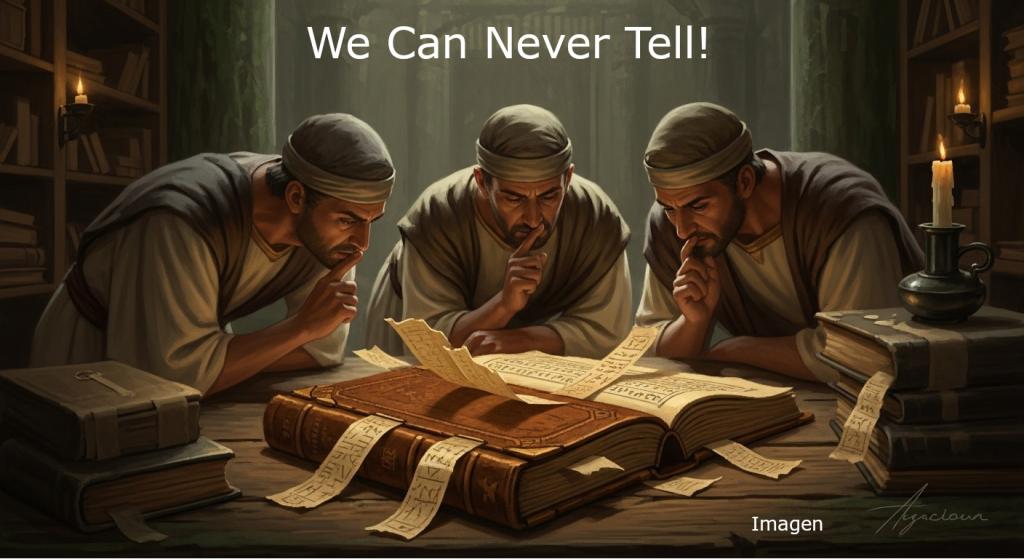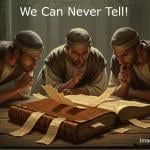A peek at Gnostic literature
Gotcha! Inquiring minds are hungry for knowledge.
We have an unquenchable thirst for knowledge. Like Adam and Eve taking a bite of the apple of the knowledge of good and evil, everyone wants to bite into the forbidden fruit of Gnosticism and banned gospels.
The early church fathers looked at Mary Magdalene’s “gospel” and said, “No.” I think they didn’t want women leading the church.
They considered the Gospel of Thomas, which was popular in the early church, and said, “No.”
I think they were threatened by intellectual approaches. They reacted to Gnosticism, with its emphasis on “knowledge,” and declared it heretical. It was easy to brand texts as gnostic. Maybe it’s good they did?

Is there anything significant to be gained from these books? Can these be “dangerous?”
A little knowledge can be a dangerous thing in the hands of those who don’t fully understand or misuse it. Maybe that’s the reason. Maybe not.
What we don’t know is if any of these “books,” written well after the time of Jesus, were written by those “in the know” or by those who wanted to emphasize certain things. History is covered with the litter of beliefs that found no practical use or were stomped out of existence.
The bad and the ugly
Is there salvation through “enlightenment?” Some gnostic-type tenets are we attain salvation through spiritual enlightenment. Enlightenment is a state of profound spiritual understanding and liberation from suffering. It’s often associated with a deep realization of truth, often involving the transcendence of ignorance, desire, and the cycle of rebirth. This aligns well with Eastern philosophy and religious beliefs.
The deep question pertaining to enlightenment is whether this means acquiring knowledge indirectly through a text or similar means, or if it mean testing values and learning through experience. It can mean both, and we need tolerance for what it means.
Information, as values, can turn lives in another direction. That’s a wonderful thing. Jesus’ preaching represented light as values that resonated with people. It was illuminating. But even more wonderful is the experiential aspect of proving values represent truth, such as love, and acting out of love for other people. Information is static, even if compelling. But love is active.
Can spiritual enlightenment be achieved through assimilating knowledge?
I say, “No.” There’s enough knowledge in the world to paper the earth from coast to coast. Don’t paper over water – it erases the ink, so knowledge is lost.
If acquiring knowledge related well to life, computers would be enlightened. They only hold the information we feed them.
Spiritual enlightenment is experiential in that it comes from experience with the real world and notions of values. We “learn it the hard way.” We can read it in a book, but then we have to test it in the real world. Only then does it become “wisdom.”
Are all “spiritual” ideas equal?
Some aren’t even aspects of truth. It may come as a shock, but we have to be discerning about “spiritual” ideas.
For example, the Cathars in Southern France primarily existed during the 12th and 13th centuries. It was their belief that a “bad” god created the universe and put them in it as fallen angels. There were two ways to end this: to become perfect or to stop procreating.
Both methods were destined to failure. None of us are ever perfect, and if we stop procreating that’s the end of us. So the church, considering this a heresy that must not exist, sent an army against them, killing over a million men, women, and children, hanging or burning them at the stake. Argh! What a mess a little knowledge can create.
Another example, the Christian order, the Templars, started international banking, explored the Holy Land, and kept travelers safe. It made them so wealthy they loaned money to Kings. They were also a secret society with secret ceremonies and secret knowledge. I don’t know if any of their secrets were true, or their hidden treasures, but it’s fun for some to explore.
The Knights Templar met an untimely end when the King of France found himself too far in debt and decided the way to cancel the Templars’ loan was to cancel the Templars. They were charged with heresy and killed. It’s easy to charge heresy when secrets are kept hidden. Heresy is an easy excuse, especially using the “guilty or ambiguous” interrogation methods of those days. People would admit to guilt just to get the dunking to stop.
Let’s charge on because we’ve bitten the apple, as usual undeterred by burning at the stake.
The knowledge of good and evil
Christianity teaches the knowledge of good and evil. It’s experiential. The Christian emphasis is on how we live our lives. At the top of Christianity are verbs. “Yahweh,” the name of God, is a verb meaning, “”He causes to become” or “He is.” “love,” the second commandment, is a verb. This is closely followed by Jesus, meaning “Yahweh saves,” in Hebrew. “Saves” is a verb. Yahweh causes salvation. Christian knowledge is active, experiential, not head knowledge.
The apostles taught voluminously, leaving us lengthy books about how to live. Knowledge proliferates, often to the point of confusion. Can we just read the Bible and learn and somehow cut through the confusion? The Apostle John summed it up in a simple action statement: “Love each other.”
So then, what is our relationship with knowledge or wisdom? Spiritual growth is a product of living the knowledge or guidance we’re given. It’s active. Yet, without the guidance of knowledge we can stumble around blindly like the Cathars and come to an untimely end. We don’t need to reinvent the wheel by making all mistakes.
In contrast, we don’t stop mystics from communing with God and seeking higher “knowledge” any more than we ban the wisdom literature from the Hebrew Bible.
We know it when we see it
Sound knowledge resonates with us. Knowledge can point us in the right direction. Preaching and teaching are enlightening knowledge. But they don’t transform us unless we use the knowledge to change our lives for the better.
The early church rejected Gnosticism
By the year 300 CE, Rome was on fire with religions. Romans worshipped multiple gods. The Roman emperor, Constantine, ceased persecuting Christians. Constantine was sick of the endless religious fighting. His mother was a Christian, so he declared Christianity the winner. He may have had a revelation himself, but a revelation might have been like the convenience of labeling something a heresy. We can’t know for certain.
Constantine told the church to get its books in order. He wanted Christianity solidified. So ,over a period of 90 years of wrangling, they selected the same books and letters Irenaeus had recommended in the Second Century. They did so after Constantine was dead. Major progress, wouldn’t you say?
Rome was full of “mystery religions.” They were more mysterious in their initiation ceremonies and worship practices, than in their beliefs. Essentially, they worshipped the Greek and Roman gods and goddesses. Some of them worshiped Isis from Egypt.
Patriarchal cultures don’t embrace women
The Middle Eastern cultures, the Greek, and the Roman were patriarchal. Men ruled. Although women sometimes had unique positions within communities, mostly these cultures were male dominated.
They were very family-oriented cultures, and both men and women were expected to abstain from extramarital sexual intercourse. Men were more likely to stray, but punishments could be severe in all of these cultures.
Who made regular visits to these cultures? The Prophetess Sibyl, from Eleventh Century BCE to around 4 AD. The prophet was many women, but they worshiped the goddess, Cybele, also known as the “Great Mother. “ “Wandering devotees of the goddess became an increasingly common presence in Greek literature and social life; depictions of Attis have been found at numerous Greek sites”.” (Roscoe, 1996. Wikipedia)
Followers of the Prophet Sybil were men who had castrated themselves, following the actions of the Shepherd Attis. This was prohibited in Rome.
The Sibyl devotees entered towns with joyous abandonment to the loud, percussive music of tympanon, castanets, clashing cymbals, and flutes, and to the frenzied “Phrygian dancing”, perhaps a form of circle-dancing by women, to the roar of “wise and healing music of the gods.”
They also had a temple in Rome. The Delphi Sibyl was the most noteworthy in Roman history, so the cult was tolerated.
Middle Eastern and Roman culture, and the apostles, who mostly rejected women as leaders, no doubt saw cults led by women as out of control and wanted to keep a lid on them.
So now we look at the “Gospel” of Mary Magdalene.
The “Gospel” of Mary Magdalene
You won’t find this book in the Bible. The early church labeled it “Gnostic” and left it out. “Gnostic” meant heresy, meaning it contradicts the fundamental teachings of the faith.
Mary Magdalene’s history
Jesus healed Mary Magdalene of seven demons, which led her to become a devoted follower and disciple. Along with other women, she financially supported Jesus’ ministry in Galilee. She was present at the crucifixion of Jesus and witnessed his burial. She was the first person to see Jesus after his resurrection, making her the “apostle to the apostles.”
For centuries, Mary Magdalene was mistakenly identified as a repentant prostitute, a misconception that has been debunked. She shows us the important role of women in the Church, as also demonstrated by the Apostle Paul. Strong traditions tell us she migrated to France, landing at Saintes-Maries-de-la-Mer.
Tradition says she preached to the locals and converted many to Christianity, collaborating with her brother, Lazarus, in spreading the Christian faith throughout Provence. Medieval legends claim that Mary Magdalene performed miracles in France, such as helping a childless couple conceive and restoring a princess to life after a shipwreck. She became the patron saint of childbearing.
The Basilica of Saint-Maximin is believed to house her relics.
Is Mary Magdalene’s “Gospel” Gnostic?
The existing copy likely dates to 190–200 CE, long after Mary’s life. Was it based on earlier copies or tradition? Possibly. Was it invented by Gnostic influence? Possibly. There were many influences in the early church.
Jesus “loved” Mary Magdalene more than other women, and revealed himself to her first. This is reflected in John 20:17, where Jesus tells Mary Magdalene, “Do not cling to me, for I have not yet ascended to the Father.” Mary, on seeing Jesus alive, could not bear to let Jesus go from her life, but he had a greater mission (my interpretation).
In the Gospel of Mary text, Peter argued that Jesus would not have revealed such important teachings to a woman, and that her stature could not be greater than that of the male apostles.
This puts it all in perspective. Would Peter have said this? Yeah, probably. The apostles were rooted in patriarchal culture in which men dominated. They were fishermen, not saints with infinite understanding. Women had their place. It took them many years to accept women in ministry, if they did at all.
In the Bible, Mary Magdalene shows us the power of transformation in Christianity. What does she show us in the Gospel of Mary? Mary likely treated other people well, not sinning, as most of us, but she was possessed by demons. She shows us the transforming aspect of Jesus’ work through the Word.
Jesus’ actions and teachings were transforming for her. They are a path to inner spiritual knowledge that is transforming. We’re to become free of our opposite nature (sin), and through this discover our true self. She encouraged fearful disciples to go preach the Gospel.
Did Mary reveal secret knowledge? A little, maybe. But was the Gospel of Mary Gnostic? No more than the opening to the Gospel of John. You can read the Gospel of Mary Magdalene, or about them, in these articles:
The Gospel of Mary is not essential reading. It’s interesting and adds a little more to our rich tapestry of knowledge about Jesus and Christianity. Mary Magdalene deserves a higher profile within Christianity. She’s a positive example to both men and women since she was very influential in the early church and in the spread of the gospel. She should not be relegated to a lost place in history.
Much of Gnostic literature is about compassion for others, wisdom, and transformation. Transformation often begins with knowledge that resonates and compels us to action.
Next, we’ll continue looking at the spiritual aspects of Christianity, partly through the Bible, and partly through more Gnostic literature that seems more valid, like the Gospel of Thomas.
Would love to hear your thoughts in the comments below. This helps me improve my work.
Please subscribe to my Patheos Newsletter.
Below is information for church planning to minister to new generations, building a community of action, service opportunities, education opportunities for new generations, and descriptions of the author’s nonfiction books.
Some things that you might love
Would love to hear your thoughts in the comments below. This helps me improve my work.
Please subscribe to my Patheos Newsletter.
Below is information for creating change in my new book, Unleash Movements that Matter: Break Through Barriers to Change.
My new book. Unleash Movements that Matter: Break Through Barriers to Change.
My new book, Unleash Movements that Matter: Break Through Barriers to Change, which I wrote for new generations, I research and explain in great detail what it takes to create change in our world. (An audio presentation is in progress.)
<iframe width=”560″ height=”315″ src=”https://www.youtube.com/embed/Nz78X7R-RrQ?si=1IaPY7utjrT7nBhe” title=”YouTube video player” frameborder=”0″ allow=”accelerometer; autoplay; clipboard-write; encrypted-media; gyroscope; picture-in-picture; web-share” referrerpolicy=”strict-origin-when-cross-origin” allowfullscreen></iframe>
Ministering to New Generations – strong impact course
How can churches minister to new generations if they won’t come to church? The church has been losing people at 1% a year, and now most of new generations won’t come.
I developed and presented a course on understanding and working with new generations. I would like to say I had rave reviews, but on a scale of 1 to 5 it averaged 4.5. Well, some people were raving.
The course helps people understand new generations, their values, and their differences. It helps people understand how to build a bridge to them and minister to them. The old worn-out things we used to do don’t work, and for good reason. This solutions focused course enables people to find new ways, appropriate ways, to minister to these generations in their local circumstances. It’s for church groups and generates deep discussion.
Free video preview of the course
<iframe width=”560″ height=”315″ src=”https://www.youtube.com/embed/wxjvFWw-vYo?si=EPSKIM7VDJ-sLA3b” title=”YouTube video player” frameborder=”0″ allow=”accelerometer; autoplay; clipboard-write; encrypted-media; gyroscope; picture-in-picture; web-share” referrerpolicy=”strict-origin-when-cross-origin” allowfullscreen></iframe>
Course on Udemy: <a href=”https://www.udemy.com/course/understanding-and-working-with-new-generations/learn/lecture/46266901#overview”>Understanding and Working with New Generations</a>
________________________
– Dorian
Our answer is God. God’s answer is us. Together we make the world better.
Restore and recreate. Take time to celebrate life. Laugh, sing, and dance regularly, even every day. Happy. This is why we dance to celebrate life: Reindeer actually running and dancing.
Building a Community of Action
New Way Forward community
Can we make positive change in our world and end a lot of suffering?
Helen Keller, who was both blind and deaf, said: “Although the world is full of suffering, it’s also full of the overcoming of it.”
The human spirit yearns for a world without suffering, but it’s through facing challenges that we progress. The world isn’t perfect, but together we can create a future with less hardship. Famine, discrimination, gun violence, and injurious economic and educational disparities are complex problems, yet understanding their root causes empowers us to find solutions.
Launching in first quarter 2025, the New Way Forward community will connect individuals seeking practical solutions and creating lasting change. We’ll focus on understanding problems and their solutions, and how to effectively create change.
Join us in building a brighter tomorrow! New Way Forward on Facebook.
Civic service opportunities
Do Unto Others Kindness Campaign, and civic engagement.
United Methodist Church Volunteer Opportunities.
Join or support Zero Hour and amplify the voices of youth organizing for climate action.
Peoples Hub. Resistance, Resilience, Restoration, Re-imagination. Online Popular Education. For movement workers to learn, connect, collaborate, and strategize – in and across the disability justice and solidarity economy movements.
Stakeholder Capitalism – a video podcast series from the World Economic Forum. Can capitalism be made to work for all of us – and to improve rather than destroy the state of the planet?
General service and aid opportunities (on One Spirit Resources Website). To add your service opportunity to the One Spirit Resources list, contact the author (me) through Facebook Messenger. Note that I only friend people I know.
————————————–
Education Opportunities for new generations
Becoming an Entrepreneur – MITx online
Evaluating Social Programs – MITx online
_______________________
Bible scripture verses are New American Standard Version (NASB), unless noted.
_______________________
Author and books
New Generations Walk with Jesus: Newer generations feel unloved, alone, lost, stressed, and are searching for a deeper spiritual connection that they don’t find in the church. This book draws on fifty years of the author’s quest to understand people, religion, and spirituality, and his work with many denominations. It provides a deep analysis of pressing questions these generations have, without denominational baggage.
Appease the Volcano: What does God require from people? The voices of the ancients from many religions echo much of the same things: It starts with law, then mercy and forgiveness, then love. Love is a major emphasis in all major religions and replaces law.
The Prophetic Pattern: Ancient and Modern Prophecy: How to distinguish the intent of various types of prophecies and oracles, both ancient and modern.
Preparing For the Future Of Work and Education: Analysis of the kinds of jobs that AI and Robotics will displace, and the educational requirements for them. AI will replace or augment thirty percent of jobs. This is an in-depth analysis citing many authoritative sources.
Author Website: Dorian Scott Cole











